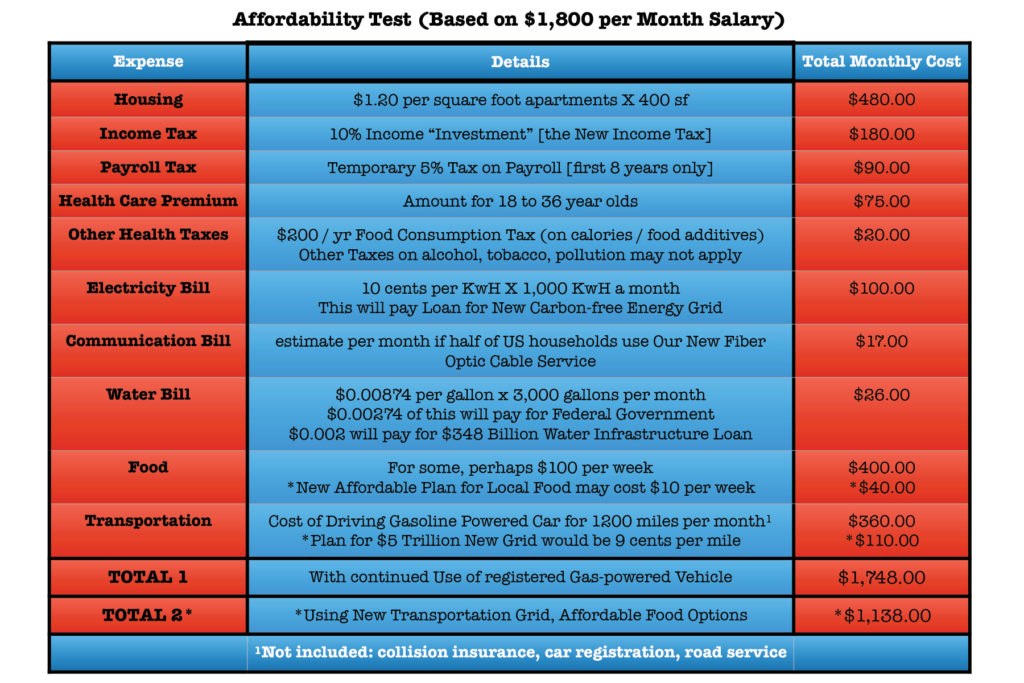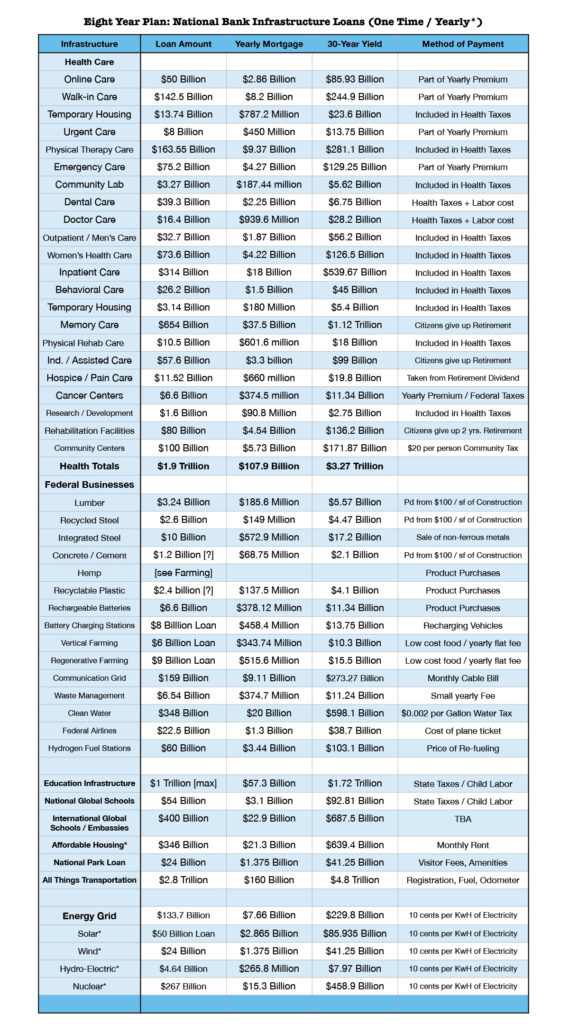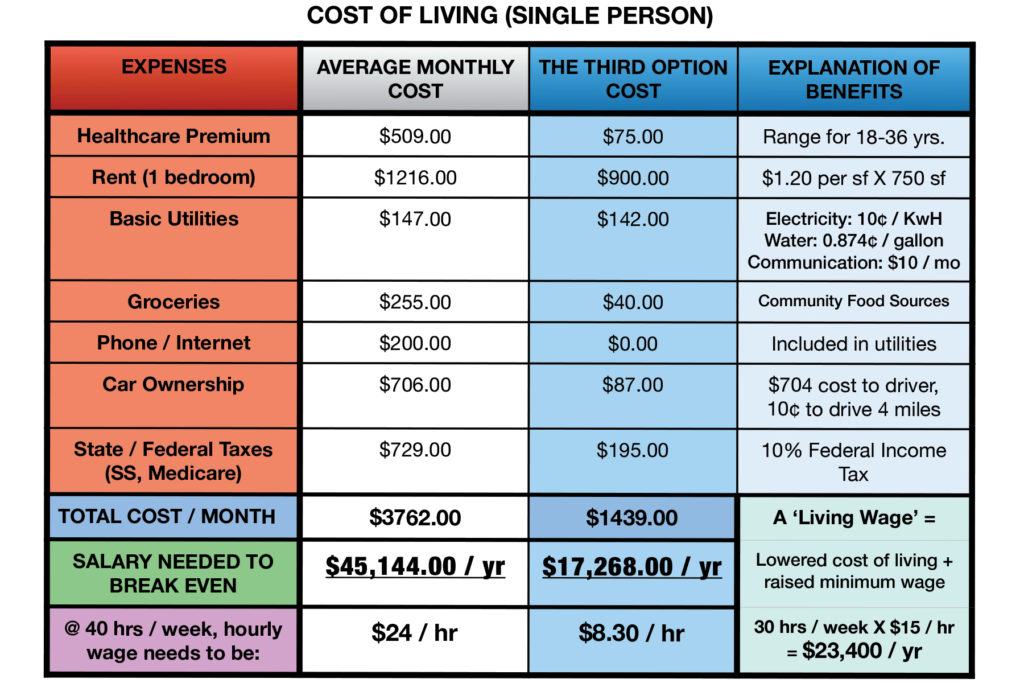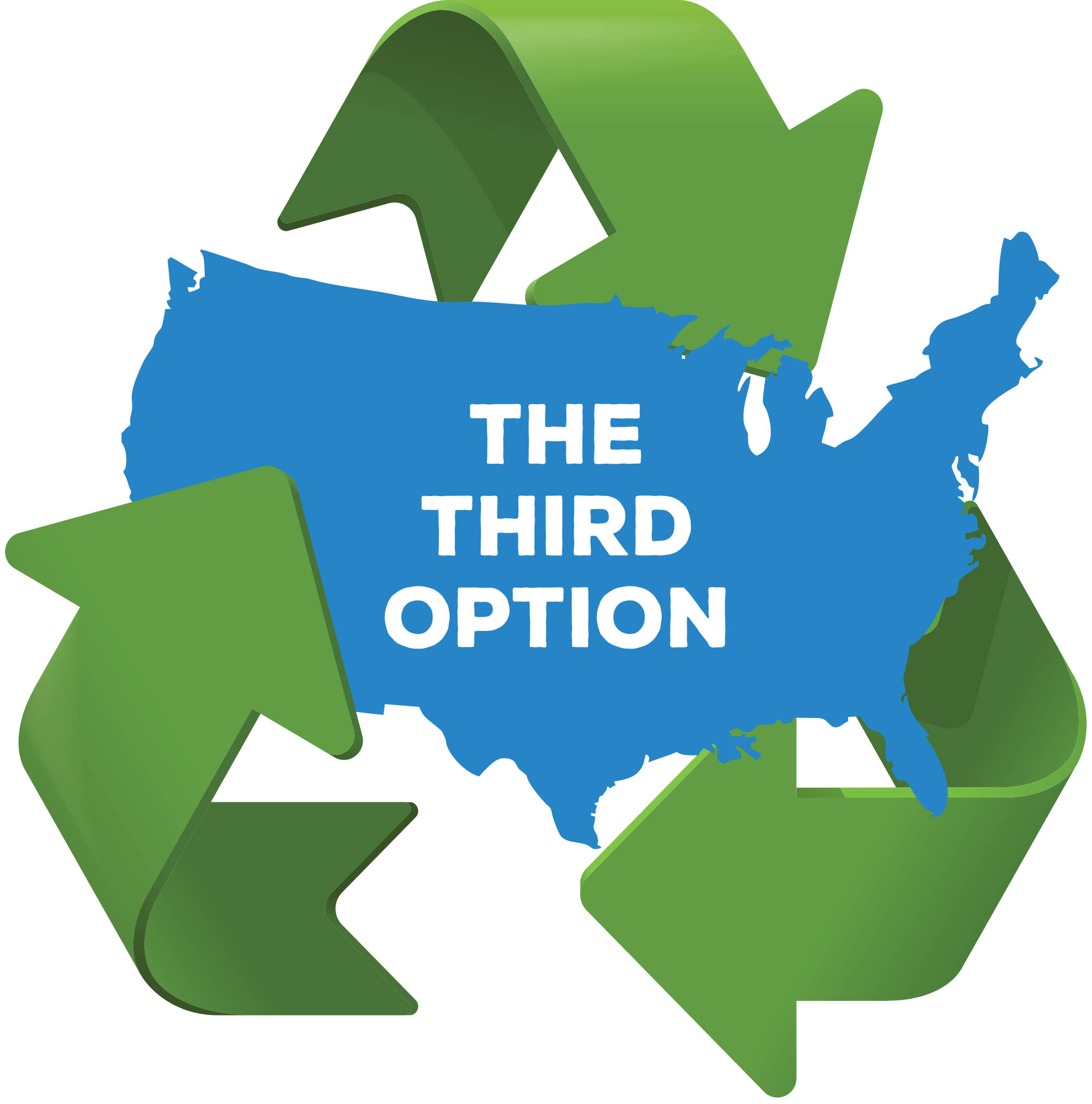How the National Bank has you covered for life.

I. All Proposed Bank Loans
If we still wish to peddle to our progeny this notion that hard work pays off, we better start by rewarding hard work with an affordable life. The National Bank is the vehicle to get us there, with lowered costs for health care, education, housing, utilities, food and transportation, while also lowering the cost for government administration of them.
We will use Capitalism to get our Democracy, by applying the same business models. The only real difference in this new model is that we would not need a ‘capitalist’ to fund us; we would use the capital being created by our own National Public Bank. The other cost-cutting perk of doing it this way is that there would be no purpose in trying to make a profit off ourselves; thus, we could chop this cost off the top as well. ‘Economies of scale’ is another cost-lowering strategy, which would occur naturally as We deliver these essential needs to every American resident. Finally, the raw materials needed to build this infrastructure are materials that we already own; they are currently sitting on or below federal land. Together, all these reduced costs would form a new ‘affordable life’ strategy.
Below are some of the loans our National Bank would make to every Community.

HEALTH CARE
$3.8 Trillion is too much to pay for Our unalienable right to life. Once We collectively take control of health care, each of us could be nudged toward taking a more active role in our own individual health. Meanwhile, who really likes sitting in an Emergency Room all day waiting to be seen, or wait 3 weeks to see a doctor? Let’s build a Health Care system for people and not for profits.
AGRICULTURE
Food plays a role in both our individual health and the health of our planet. You will not be getting any junk food at our grocery stores, only something healthy for you and the planet, at a great price. We will employ small farmers in the process and utilize the latest regenerative and vertical farming practices. During this process, We would begin to tackle the mountainous amount of food and packaging waste related to this industry.
COMMUNICATION
People are innately wired to transmit whatever they receive; we were already a giant Communication Network before the internet ever came into being; the internet is only the logical extension of our essential human need to share information. It was created using taxpayer money, but instead of furthering Democracy, it has been usurped by the private sector in order to further a profit-seeking agenda.
Our Communication Grid will connect people directly to their Community, to discuss the business necessary for them to “share in a common life.” It will also connect people to their essential needs, like health care, education, and banking. Finally, it will Connect all Communities together, in order for them to share best practices in every facet of Community life; in doing so, everyone will finally have a ‘stake’ in how this ‘common life’ unfolds.
HOUSING
Unlike healthcare, communication, or agriculture, it is less easy to make housing affordable. The margins are much smaller. Therefore, we must get control of the materials used to build the housing. Cheaper materials can put our $100 per square foot construction cost within reach.
ENERGY
The private sector will never stop selling us oil when there is a profit to be made from it. If we want more sustainable solutions, we will need to have control of the capital it takes to build greener infrastructure. The only way to fully replace oil and coal would be to integrate a nuclear energy option into the diversity of other ‘green energy’ infrastructure; several choices are already in the ‘beta testing phase.’
EDUCATION
Students would now leave Secondary Education (high school) with an associate degree and a job waiting for them. If students want jobs that require further study, We would secure them a loan from Our bank, send them off for Tertiary Education (College); they can pay the loan back later while working at the job We have set aside for them. Meanwhile, We are going to coordinate Secondary and Tertiary Education so Associate Degrees represent the first half of an equivalent 4 year degree, meanwhile better defining the requirements for all college degrees, so that similar credits would be ‘transferrable’ when students move between colleges.
TRANSPORTATION
The margins are small in the transportation sector as well, and oil must be removed from any future equation, as well as the threat of car accidents, which would benefit our Health Care bottom line. Many in Our government use air transportation, and many have been given an “open tab” on this usage. Boeing has been collecting a paycheck from the US government for quite a while. If they cannot build Us some electric planes “at cost”, they are no longer of any use to Us, and We will have to build them ourselves. Similarly, if American car companies cannot build us electric and hydrogen fueled vehicles per our new transportation specifications, We would be forced start up our own businesses, in order to go where our emerging future lies. The private sector would then finally learn who really needs whom.
NATIONAL PARKS
$32 Billion a year is going to private vendors within our Park system, but only $282 million is coming back to help pay for the NPS budget, which is currently around $12.6 Billion. This is not acceptable anymore. The Parks currently need $12 Billion in infrastructure upgrades. The Third Option would raise the loan to $24 Billion, in order to build infrastructure that allows the most amount of people to enjoy the Parks in the least invasive way possible. Outside lodging and restaurants, better parking and shuttle services, unobtrusive walking and biking paths— Our business model needs to combine tourists getting close to nature while still protecting and respecting it. Whether people wish to recreate, exercise, relax, reflect, ‘rough it’, be pampered, do research, be educated, etc., renovations need to solve for overcrowding while improving the overall experience for visitors.
II. How the Bank Serves Everyone
SMALL BUSINESS
The National Bank would help Small Business by covering all employee benefits (health care, retirement, unemployment, education and job re-training, et al), and eventually remove the need for a ‘payroll tax’, once retirement dividends sufficiently accumulate in the Bank. Small Businesses only need to pay their employees $15 an hour for 30 hours a week, and invest 10% of their earnings in the Bank each year, instead of the usual income tax.
The Bank would also help Small Business get started with various loan opportunities. To protect the People’s investment in small business, bankers would be tasked to set Small Business up for success, by offering business models that work, and helping connect entrepreneurs with human resources from top to bottom. The proposed Community Center would offer opportunity for pop-up shops, small food venues, and retail spaces so new businesses could test out their products and services first before making any larger business commitments.
A LIVABLE WAGE
The main job of the National Bank would be to turn $23,000 ‘minimum’ employee salaries into livable wages, by lowering the cost of all essential needs.

Health care and communication would be the easiest to lower, as the private sector currently charges us four times what the Bank would be able to provide—meanwhile, the Bank could supply communities with even better coverage on both these services. The Bank could also provide affordable food options as well, plus reasonable deductions on everyone’s energy and transportation bills. Water would be slightly higher, because an added ‘water tax’ of 0.274 cents per gallon would be imposed to pay for the administration of the entire Federal Government, now that the National Bank would be taking over many of its services.
Housing is the most expensive service to provide; to make it ‘affordable’, we would need to lower building costs to $100 per square foot. The only way to do this is to lower the cost of building materials. The only way to do this is to use the National Public Bank to loan money to ‘federally funded businesses’, that would provide new green integrated steel, cement, lumber and hemp (which is why these loans are listed on the National Bank graphic above). Most of the raw materials sit on federal lands, so this would immediately drop the price; turning these businesses into non-profit ventures and utilizing economies of scale (by providing this service to every Community) would bring the cost of construction within acceptable ranges.
HOW IT HELPS THE PLANET (which helps the people on it)
By filtering all our Energy, Transportation, Agriculture, and Construction materials through the National Bank, we could mandate that it must be ‘green’. Turning things ‘green’, unfortunately, bumps the price up for private sector businesses (which is why they do not provide it), but through a National Bank, the price to Americans would be lower than the ‘cheap dirty version’ they currently receive, because the People would own the ‘capital’, through owning the Bank.
Professor Eugene Chen—and his team at Colorado State University—are nearly complete in their mission to invent ‘infinitely recyclable plastic’, and The Third Option would completely fund this endeavor through the National Public Bank; We would use it to pay for Public Education, by charging our children to remove the old plastic, and run the business of providing this infinitely recyclable plastic to the world. We would also utilize the work of many scientists in the field of waste management, who are using nature to turn waste into energy, fertilizers, potable and non-potable water, fuel and heat sources, and even create large ‘carbon sinks’, through utilizing biomimicry to absorb greenhouse gases before they get released into the atmosphere.
HELPING THE (RE)TIRED, THE POOR, THE RESTLESS…
The National Bank ties all our fates together, by seeing Americans as equal participants in this ‘common life’. Through the process of living—earning money and spending it— we should all receive some residual benefit for any ‘profit’ it incurs. The 4% interest that drives money creation—which is turned into human effort and then realized through the tangible goods and services we provide to each other—would serve as this stakeholder ‘share’; a ‘retirement dividend’ received later in life.
Allocating an equal portion of each year’s income investment to resident National Bank accounts would also serve, if necessary, as a pseudo ‘basic income’ for those who require assistance at difficult moments in their lives (where they would become unable to contribute to overall society). This might include ‘rehabilitation’ services, potential ‘disaster relief’, or financing for anyone who chooses to go off-grid; it could provide homeless services, or educational retraining. In each case, however, utilizing it would lower one’s retirement income stream later in life.
There would be a substantial amount remaining in everyone’s account at the time of their passing –around 2.7 million Americans die each year—and this money could provide many services as well. It would be up to Congress to choose how best to utilize this money.
